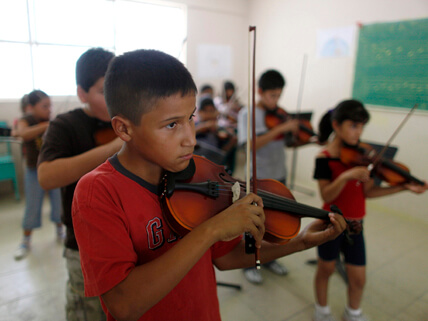Ten-year-old Jose Angel rehearses on the violin with classmates at their school in Ciudad Juárez, October 14, 2010.
The cliché “practice makes perfect” has never been true. No one’s perfect. However, with practice, can anyone become an expert? Researchers disagree. While recent studies have confirmed the benefits of practice, they stop short of saying that practice alone is the key to honing expertise.
In his 2008 book Outliers, author Malcolm Gladwell popularized the “10,000-hour rule”—that anyone can become an expert in a task with 10,000 hours of practice. As it turns out, Gladwell’s “rule” appears to oversimplify the findings of a 1993 study of the habits of young violinists and pianists. The 1993 study suggests that the hard work and determination of practice accounted for about 80 percent of the difference between elite performance and amateur performance. Yet, when Case Western Reserve University researchers recently tried to replicate that study, they found that there’s more at play in determining expertise. The Case Western researchers interviewed three sets of 13 aspiring violinists who were considered the best, good, and less accomplished. From the musicians’ logs, researchers found that violinists rated as good and the best averaged about 11,000 hours of practice before age 20; the less accomplished spent fewer hours practicing. However, practice accounted for only about 25 percent of the difference between good and great violinists. If both good and great musicians practiced the same amount, what made the key difference?
Researchers at Brown University found that practice alone doesn’t necessarily lead to success. Rather, the right kind of practice is what really matters. Their study claims that “overlearning”—that is, practicing beyond the point where one thinks she or he can’t get any better—locks in performance gains. Meanwhile, a Michigan State University study found that factors such as “working memory” can explain differing abilities of musicians, while the impact of practice is tiny for activities such as computer science, being a military pilot, or basic educational attainment.
While the 10,000-hour rule remains popular with those who believe that anyone can become an expert at anything with practice, researchers say it takes more: talent, intelligence, short-term memory capacity, work ethic, opportunity, and how early a student starts learning a skill. While the value of practice may have been oversold, becoming an expert in any area indeed takes years of hard work, among other pieces of the puzzle.
Image credit: © REUTERS/Tomas Bravo
Related Links:
- Practice Will Make You Better, but Maybe Not the Best
This article covers the recent studies on the importance of practice to learning and excellence.
(Source: Smithsonian Magazine, August 22, 2019) - Yo-Yo Ma on Intonation, Practice, and the Role of Music in Our Lives
An interview with the legendary cellist, who still strives for perfection.
(Source: Strings Magazine, September 17, 2015) - How Many Hours Do Olympic Athletes Practice? Prepare Your Jaw to Drop
An article exploring the many ways athletes prepare for the Olympics.
(Source: HelloGiggles.com, February 12, 2018) - How to Practice for a Spelling Bee Competition
An article that spells out fun ways to prepare for a spelling bee.
(Source: HomeSpellingWords.com; accessed January 8, 2020)




